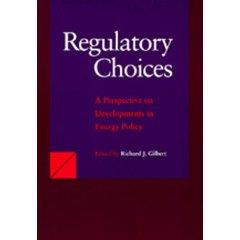| 2020ok Directory of FREE Online Books and FREE eBooks |
Free eBooks > Business & Investing > Economics > Sustainable Development > Regulatory Choices: A Perspective On Developments In Energy Policy
Regulatory Choices: A Perspective On Developments In Energy Policyby Richard J. Gilbert  Download Book (Respecting the intellectual property of others is utmost important to us, we make every effort to make sure we only link to legitimate sites, such as those sites owned by authors and publishers. If you have any questions about these links, please contact us.) link 1 About Book Book Description Regulatory Choices offers the first comprehensive economic history of energy policy and its consequences for California, where some of the most innovative and far-ranging programs of regulatory reform have originated. The authors of this volume have gathered together an impressive wealth of material about actual policy decisions and their repercussions and have subjected their findings to astute economic analysis. This book will serve for years to come as an invaluable reference on the costs and effects of various energy policies. With its focus on bringing prices in alignment with the true cost of producing power and delivering it to the customer, the first part of the book outlines the issue of setting utility rates and considers some of the proposals to provide regulated industries with incentives to respond to economic and environmental concerns. The problems of energy supply occupy the second part of the book, which includes a survey of the costs of alternative energy sources and estimates of their environmental impacts, as well as a case study of the construction of the Diablo Canyon nuclear power plant. The book concludes by documenting the results of subsidy programs that were designed to target the development of wind power and residential energy conservation. Regulators, we learn, have a mixed record when it comes to managing the production of energy. Some conservation programs have enjoyed considerable economic success, particularly those that correct a lack of consumer information. Others, such as the renewable energy tax credits or programs designed to subsidize new technologies, have cost much more than the value of the energy they have saved. What emerges clearly from this study is that regulated industries are not immune from the forces of competition. About the Author Richard J. Gilbert is Professor of Economics and Director of the Universitywide Energy Research Group at the University of California, Berkeley. He has written widely on energy economics, regulation, and industrial economics. Related Free eBooks
| Related Tags |












SEND A COMMENT
PLEASE READ: All comments must be approved before appearing in the thread; time and space constraints prevent all comments from appearing. We will only approve comments that are directly related to the article, use appropriate language and are not attacking the comments of others.